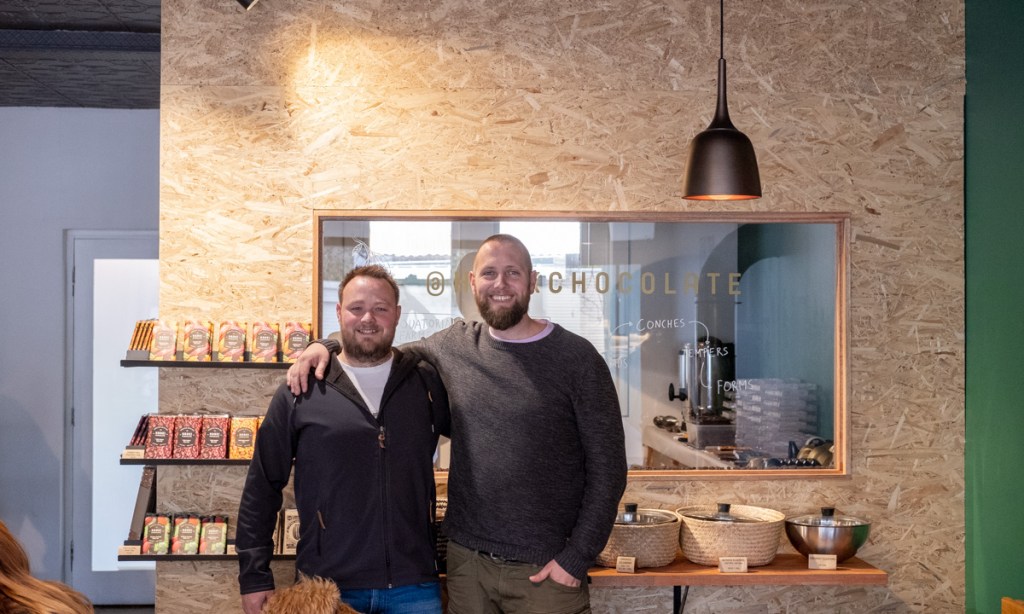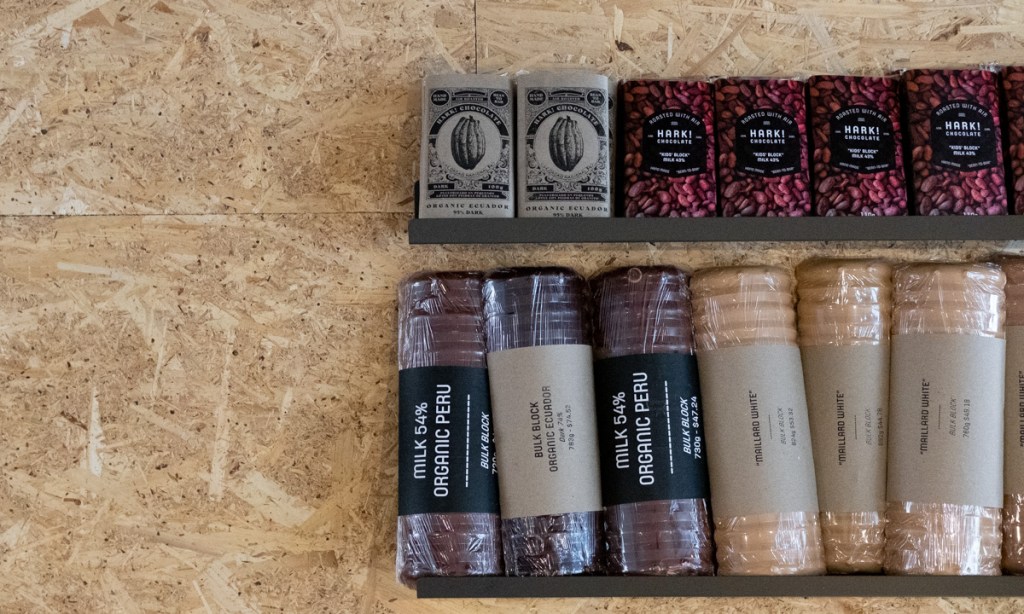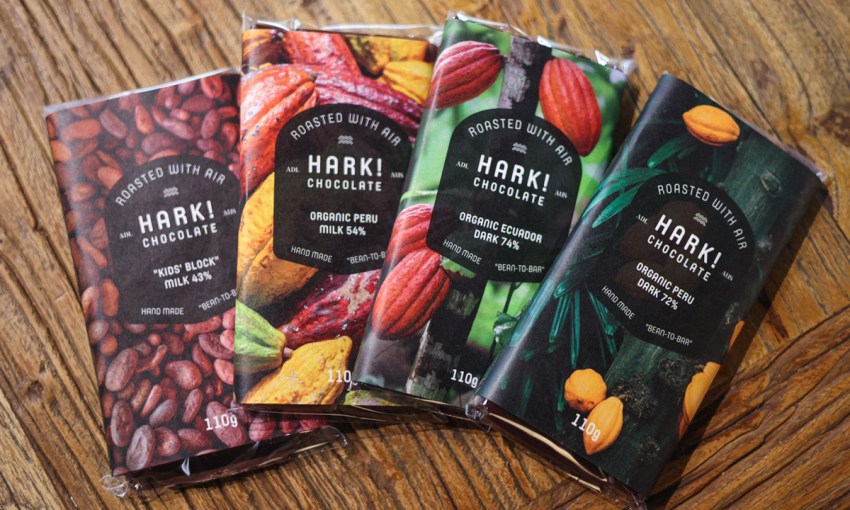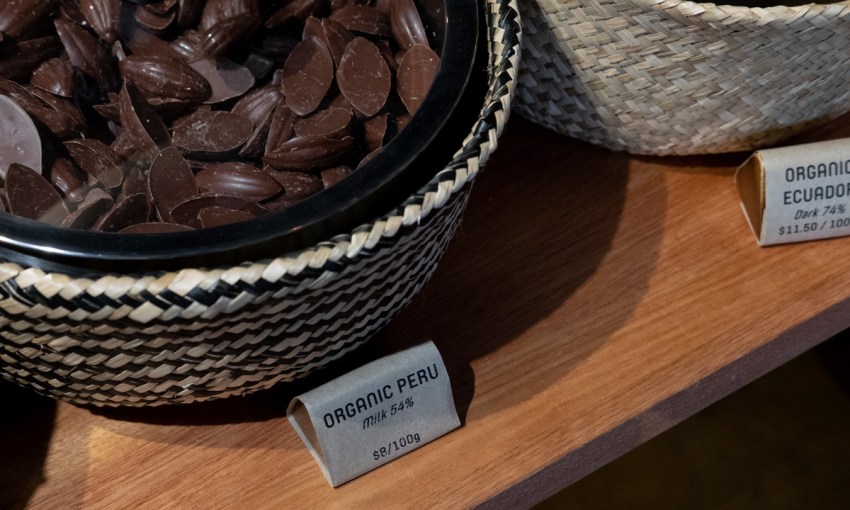Coffee roasters Hark are kickstarting a small-scale craft chocolate scene in Adelaide, creating bean-to-bar blocks that showcase the farming practices and processing methods of cacao growers.
There’s a chocolate revolution underway on Duthy Street
In a tiny room carved out of the floor space of café and roastery Hark Coffee on Duthy Street, Theo Engela and Sam McKay have a revolution in the works.
Signs of cacao activism in the enclave are slight when CityMag visits: four open blocks of chocolate on a bench and two chocolate-making machines, one of which is still unused.
It’s not a lot of gear, but their hopes for instigating change in the Adelaide mindset are grand.
The duo founded Hark Coffee at the end of 2018, building off the well-established wave of specialty coffee that had risen in tandem with Adelaide’s small bar scene.
By the time Theo and Sam decided to enter the industry together (Sam roasted for Sublime Coffee previously), the industry was flourishing. To roast in-house was no longer a competitive edge. Sam sought a fluid-bed roaster – an uncommon choice over the more conventional drum roaster – as a point of difference.
What he’d seen fluid-bed roasts achieve were coffees that had bright highlighted flavours that sat against a darker backdrop, like “diamonds… on a black velvet sheet”, he says. Drum-roasted coffee, in comparison, achieves these brighter flavours through lighter roasts, which he says is like layering “acid upon acid”.
The breadth of flavour Sam wanted to create through the roasting process expanded as he became more familiar with the coffee-growing process. One year into the business, he and Theo went on a trip to Brazil and were awakened to the many ways coffee is influenced through agriculture – from soil and climate, to plant variety, to the processing method.
“We started to notice different regions had common flavours… ‘Are you noticing that everything from that region has a rosy note?’,” Sam says.
Back home, Sam and Theo began to have new kinds of discussions with their Hark clientele, many of whom have joined them on their learning journey.
“People are starting to use words, like, ‘Is this honey process?’ Because we’ll get microlots in. Even, I can say ‘microlot’ and people know it’s a higher quality coffee, instead of sounding like a weirdo, you know?” Sam says.

Theo and Sam at Hark. This picture: Johnny von Einem
Ever since the founding of Hark, Theo, who is also a winemaker and co-owner of Chaffey Bros., has toyed with the idea of employing a similar approach to chocolate. It was an idea, at first, sceptically received.
“[Sam] thought I was joking, my wife thought I was joking, everyone thought I was not being serious,” Theo laughs. Regardless, he experimented behind the scenes, until he was almost sure he was onto something.
“Theo rang me and… was like, ‘I’ve just got to tell you what I’m doing, because it’s starting to involve a lot of capital expenditure, and, look, I think we need to get into chocolate’,” Sam recalls.
Hark Chocolate launched in May this year, and features an evolving range of blocks made from Ecuador- and Peru-sourced cacao.
The window looking into the miniature chocolate-making facility is marked with a chart demonstrating Hark’s process – known as ‘bean to bar’.

The process, the result
Theo roasts the cacao beans using the same machine Sam uses for coffee, creating a roasting profile (meaning programmed changes in heat over the course of a roast) to bring out flavours in the end product that reflect the farming practices and processing methods employed by the cacao growers.
In two versions of the Ecuadorian dark chocolate – a 74 per cent and a 95 per cent – a bright fruit characteristic carries across, despite the 95 per cent having a much more robust flavour overall.
Theo is approaching the creation of his chocolates in the same way he does wine.
“You’ve got to try and get the flavours out of the source material. That’s how I’d like to think about it,” Theo says.
“In winemaking, it’s what are we seeing in the vineyard when we’re tasting the grapes, as it’s ripening? How can we express that in its most honest way?
“I’ve got no interest in doing sprinkles and wild flavour additions… I just want to make really honest, big blocks of single origins.”
Hark’s chocolate is available in small single pieces, 110g blocks, and 700-ish gram bulk blocks.

Bigger blocks are better. This picture: Johnny von Einem
Bean-to-bar chocolate makers are still a rare find in South Australia. Haigh’s is a notable example, but Theo hopes to see more businesses pop up at a similar scale to Hark.
“It’s like craft beer or craft gin, or it’s like coffee. We don’t just always want to drink our own coffee. You want to enjoy the genre. You want to enjoy everyone in the community,” he says.
The ultimate goal is to develop a chocolate culture in South Australia similar to that of coffee, beer and gin. And as local palates become attuned to the nuances of cacao sourced from different regions, farmers will be able to capitalise on their newfound status.
“People that are making commodity coffee were on the border of, ‘Coffee’s not worth making anymore’,” Sam says. “But now this specialty coffee, they’re going, ‘Oh my goodness, we can charge three times the price. This is becoming a crop we see longevity in’.”
Theo believes South Australia has a unique advantage over other states as the place where such a shift in chocolate can take place.
“As a market, it’s one of the most mature average palates maybe anywhere in Australia. Maybe anywhere in the world,” he says.
“We’ve got so much diversity and so much depth. Everybody knows somebody who’s in food. It’s one of the things that we can do as good as anyone in South Australia.
“It probably started with the Central Market, a lot of the migrant populations in Adelaide bringing new flavours. And we’re just so blessed. We’ve got so many influences. It’s incredible.”
Hark Chocolate is available to purchase at Hark Coffee on Duthy Street in Malvern.





